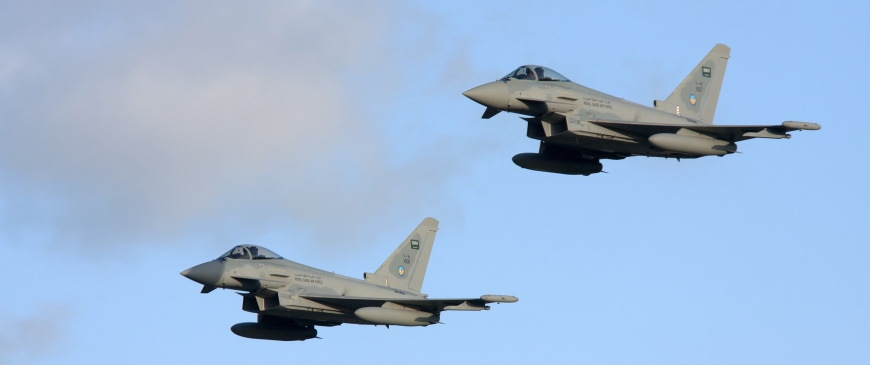
Who should hold Europe's arms?
BERLIN – Earlier this year, Germany decided – over the objections of France and the United Kingdom – to extend its arms embargo against Saudi Arabia, reflecting concerns about the legality of the Saudi-led military intervention in Yemen. The dispute highlights the discord and inefficiency that still plague European arms-export policy. And failure to address it is severely undermining the European Union’s efforts to raise its defense profile.
Initiatives like the European Defense Fund – which seeks to coordinate, supplement, and amplify national defense investments – have been hailed as silver bullets for Europe’s defense-capability problem. But, as Anne-Marie Descôtes, France’s ambassador to Germany, has pointed out, if European governments are to develop military equipment jointly, they have to be able to rely on their partners to export the necessary components. That requires a transparent and predictable set of export rules.As my co-author, Beth Oppenheim, and I set out in our Centre for European Reform research paper, “Up in arms: warring over Europe’s arms export regime,” weapons exports can facilitate defense cooperation with allies by improving interoperability. In some cases, they can also be used to raise the defense capabilities of strategic partners, bolstering efforts to address globally significant security challenges, such as piracy or terrorism. At home, exports to third countries allow European defense companies to make the most of economies of scale, while forcing them to produce more competitive products. The more countries that are involved in these exchanges, the bigger the impact.
But export restrictions also have an important role to play. Just as arms embargoes can rein in a country’s aggressive behavior by depriving it of military resources, restricting arms exports can constrain governments that might use them to carry out human-rights abuses. For such restrictions to work, however, they must be applied widely, consistently, and transparently. In this sense, the absence of a coherent arms-export policy damages the EU’s credibility as a values-based project.
To be sure, an EU-wide arms-export framework already exists. In fact, with eight criteria for the issuance of arms-export licenses – including respect for humanitarian law – it is one of the world’s strongest. But the rules are not enforced. If the EU is to have any chance of creating a defense union, that must change.
Success will require European institutions to overcome considerable resistance. Defense is considered a matter of national sovereignty, so there is no political will among European member states to cede control over their arms-export policies to, say, a supranational supervisory body.
Complicating matters further, before a decision is made to restrict exports to a particular country, EU member states must agree on whether doing so aligns with their interests. That is easier said than done. With regard to Saudi Arabia, for example, some – notably, German Chancellor Angela Merkel – have concluded that arms sales are ultimately destabilizing. But others, such as former British Foreign Secretary Jeremy Hunt, have argued that arming the Saudis enhances EU countries’ ability to contribute to a resolution to the conflict in Yemen. Beyond political leaders, civil-society organizations have expressed concern that transferring powers to the European Commission, which is less accountable to voters than national governments, could reduce transparency. Some fear that an EU-wide policy would naturally be based on the lowest common denominator, limiting its impact.Even in this unfavorable environment, EU institutions can take steps to harmonize arms-export policies. They could plan to spend more on research and development, work with national governments to identify gaps in the EU’s defense capabilities, and make a list of the needed military equipment. Capable countries could then agree to develop that equipment, in exchange for EU funding.
In the long run, this could lead to the Commission gaining more influence over companies’ export policies. It could then impel arms producers to favor European technology requirements over those of external customers and to adjust to which countries they sell arms. To enhance democratic legitimacy, the European Parliament should play a greater role in determining which projects are funded and for whom.The Commission could leverage its influence over trade in dual-use goods to exert greater control over arms exports. The EU could also standardize the format of the annual report on export licenses that members states are required to produce, and enforce stricter deadlines. A peer-review meeting would allow governments to share experiences and identify best practices.Finally, the EU could encourage member states to strengthen end-use controls over exported weapons. It could contribute to this expensive, time-consuming, and politically difficult process by deploying teams of experts to importing countries. Such activities – and the exchange of sensitive data that they entail – would have to be negotiated in advance and incorporated into export agreements.>Ensuring that EU-wide arms-export rules are enforced will be an uphill battle. But if EU member states are serious about deepening defense cooperation, let alone creating a defense union, it is a battle that must be fought.
Sophia Besch is a senior research fellow at the Centre for European Reform.
